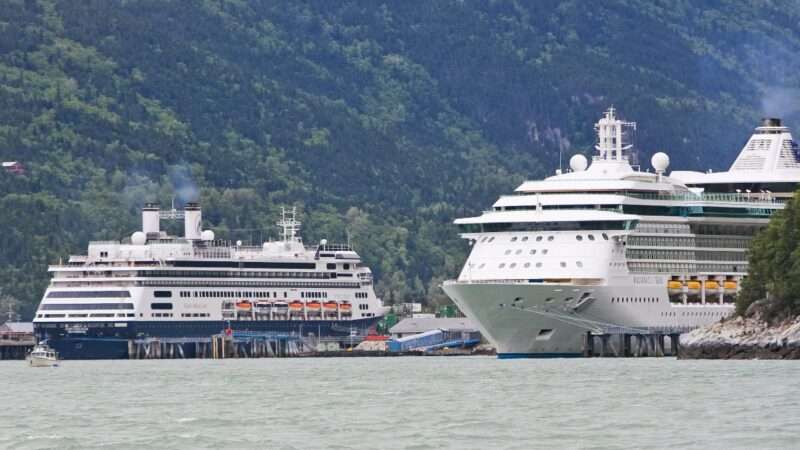
President Joe Biden Monday signed a bill into law that will allow cruise ships to return to Alaska this summer, apparently ignoring that it was our own terrible federal maritime regulations that made the bill necessary in the first place.
Rep. Don Young and Sens. Lisa Murkowski and Dan Sullivan, all Republicans who represent Alaska, introduced the Alaska Tourism Restoration Act in March. The bill allows 51 specifically named cruise ships to bypass Canadian ports and go directly from Washington to Alaska and back.
Anybody who has taken Alaskan cruises in the past on these major cruise ships has stopped at ports in Canada. They might not have realized that a federal law—the Passenger Vessel Services Act of 1886 (PVSA)—essentially requires Canadian detours.
The PVSA is a protectionist maritime law that requires that large vessels owned by American companies, transporting passengers between U.S. ports, be made in America and crewed by Americans. It is similar to the Jones Act, which establishes similar laws for cargo transportation.
It is a hamfisted attempt to heavily tip the scales in favor of American shipping and maritime interests. It’s not even subtext: An explainer from Customs and Border Protection states outright that its intent is to provide a “legal structure that guarantees a coastwise monopoly to American shipping and thereby promotes development of the American merchant marine.” The purpose of the law is to “advance the United States merchant marine and fleet by restricting the use of [non-compliant] vessels in the United States territorial waters.”
But 135 years later, that’s not how things have panned out. Colin Grabow, a trade policy analyst with the Cato Institute, points out that this law has not resulted in an American cruise ship manufacturing base. America has not built a cruise ship since 1958; the law is protectionism for an industry that doesn’t exist.
Instead, cruise ship companies work around the law by stopping in foreign ports between U.S. ports. For the Alaska cruise, that means stops in Canada. This, amusingly, means that a federal law that supposedly exists to protect American maritime interests has in reality led to cruise ships having to make stops in Canada and increasing that country’s tourism revenue instead. No wonder the Canadian government lobbies to keep the PVSA intact.
But, in March 2020, Canada banned cruises from stopping at its ports as part of its efforts to contain the spread of COVID-19. It plans to keep this ban until at least February 2022, So it is not currently possible for major cruise ships in America to resume these Alaska tours while still being in compliance with the PVSA. The Alaska Tourism Restoration Act allows these cruise ships to simply pretend, by legislative fiat, that they have visited Canada by sending an email to Canadian and U.S. Customs and Border Protection officials.
Grabow notes that of all the massive major cruise ships that sail along America’s coastal waters, only one is PVSA compliant, and even that’s a stretch.
“There is only one PVSA compliant large cruise ships in the entire country, Norwegian Cruise Line’s Pride of America which operates out of Hawaii,” Grabow tells Reason via email. “However, that ship required a special waiver to operate under the PVSA as it was mostly built in Germany. That waiver was secured with the help of a major lobbying effort.”
Canadian ports that have come to rely on that tourism revenue are now worried about what might happen next. Those Canadian towns may be pleased to hear that the Alaska Tourism Restoration Act is set to sunset in March of 2022 or whenever Canada lifts its ban on cruise ships.
This is unfortunate because these stops are being forced not by consumer demand but by government mandate. It may well be that travelers do enjoy these stops in Canada. But cruise lines don’t actually have the option to adjust for where tourists actually want to travel as long as the PVSA remains.
When Biden signed the bill yesterday, he simply tweeted about how passing the Alaska Tourism Restoration Act helps “revitalize” Alaska’s tourism industry. But he did not mention that the PVSA is actually responsible for Alaska’s suffering, nor did he indicate any plans to get rid of it.
from Latest – Reason.com https://ift.tt/3yzzCT8
via IFTTT